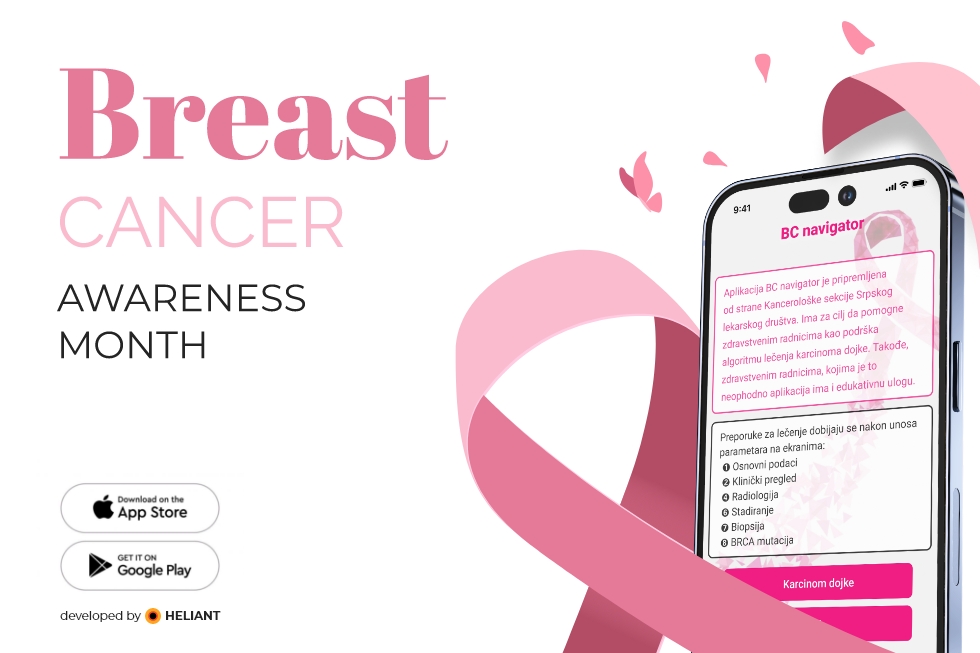Published in honor of Breast Cancer Awareness Month
Breast cancer stands as a major health concern, affecting millions of individuals and their families worldwide. In Serbia, according to the Institute of Public Health, breast cancer remains one of the leading health challenges faced by women. As October marks the Breast Cancer Awareness Month, it becomes imperative to not only spread awareness but also explore how technology can be harnessed in the detection, treatment, and overall management of this disease.
Digital Health: A Transformative Agent
The digital health landscape is evolving rapidly. Technologies such as AI-driven diagnostic tools, telemedicine platforms, and digital patient registries are collectively forging a new path in the battle against breast cancer.
These digital registries, in particular, are pivotal in collecting Real-World Data (RWD) – information derived from patient health records in the healthcare information system Heliant, and other sources. When harnessed effectively, this data offers invaluable insights into the real-world efficacy and safety of treatments.
Our company has developed a registry that further amplifies the capabilities of these digital tools. It consolidates all available data on the disease, contributing to enhanced monitoring and treatment of patients. Moreover, this registry facilitates the automatic exchange of data between different parts of the system, streamlining the communication process among healthcare professionals and making their interactions more efficient.
Databases created through healthcare information systems like Heliant are increasingly playing a crucial role in clinical trials. They assist researchers in identifying potential participants based on specific criteria and expediting patient recruitment. Additionally, data from these registries can supplement clinical trial results, offering a broader perspective on treatment outcomes in varied real-world settings. Before the approval of breast cancer drugs, RWD can illuminate the progression of the disease when untreated or under existing standard treatments. This information also underscores gaps in current medical care, resource utilization, treatment adherence, and any variances between real-world clinical practices and established guidelines.
Diagnostics Assistance & Treatment Management
The diagnostics landscape is witnessing a transformative shift, driven in large part by the integration of Artificial Intelligence (AI). Particularly in the realm of mammography, machine learning techniques are leading this change by significantly enhancing image analysis capabilities. AI algorithms can process vast amounts of image data rapidly, identifying subtle patterns and anomalies that might be overlooked by the human eye. While AI supports image analysis, it doesn’t replace the expertise of radiologists. Instead, it acts as an invaluable assistant, flagging potential areas of concern on mammograms.
In today’s digital age, tools like mobile applications play a pivotal role in equipping physicians with the resources they need to offer optimal care to breast cancer patients.
The BC Navigator, a mobile application developed by our company in collaboration with the Cancer Section of the Serbian Medical Society stands as a testament to the power of technology in aiding the medical community. This application is tailored for physicians, offering assistance in both the diagnosis and treatment phases of breast cancer. While The BC Navigator is just one example, its development underscores the broader potential of digital tools in revolutionizing breast cancer care. By harnessing these technologies, we can ensure that both patients and physicians are better equipped to navigate the complexities of diagnosis, treatment, and recovery.
Patient Empowerment
In today’s health-centric digital age, mobile applications are more than just tools; they’re empowering platforms. These apps provide not only educational resources and self-check tutorials but also foster a sense of community through digital support groups. Reminders for regular screenings instill proactive health behaviors, ensuring that patients stay ahead in their health journey. When undergoing treatment, applications that come equipped with features like treatment trackers aid patients in maintaining their regimen, monitoring side effects, and seamlessly organizing appointments. By placing crucial information and support at the fingertips of patients, these digital solutions are transforming them into active participants in their care journey. For those undergoing treatment, certain apps that offer treatment tracker features help track medication schedules, side effects, and appointments. This aids patients in staying organized, adhering to their treatment plan, and communicating effectively with their healthcare providers.
In honor of Breast Cancer Awareness Month, it is crucial to emphasize the power of digital health in reshaping the trajectory of breast cancer care. As the healthcare sector embraces digital innovations, the journey from diagnosis to recovery becomes more informed, personalized, and effective. By combining human expertise with technological prowess, we hope to see a future where breast cancer is detected earlier, treated more efficiently, and where survivors thrive in greater numbers.
You can download BC Navigator on Google Play and App Store:
